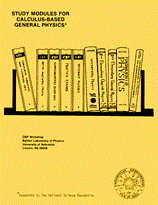Instructional Materials in Physics and Astronomy

Calculus-Based General Physics
Date of this Version
1975
Document Type
Article
Abstract
Capacitors are important components of electronic circuits and of electrical machinery and power grids. You can find large oil-insulated capacitors on powerline poles or small ceramic-insulated capacitors in a radio. In each application the capacitor is used to store electrical charge and electrical energy - for example, sometimes for a short time in an alternating-current cycle, sometimes for a long time until the energy is needed, as in a strobe light for a camera. Your body can be a capacitor, storing up enough charge and energy to cause a painful spark when the capacitor discharqes.
Practical capacitors are basically two conducting plates or sheets separated by an insulator (dielectric) such as air, oil, paper, plastic film, or even the oxide layer on one of the conducting surfaces. This module will treat the basic physics of capacitors.


Comments
From Study Modules for Calculus-Based General Physics
Copyright © 1975 CBP Workshop, University of Nebraska–Lincoln.
Reproduction rights granted.